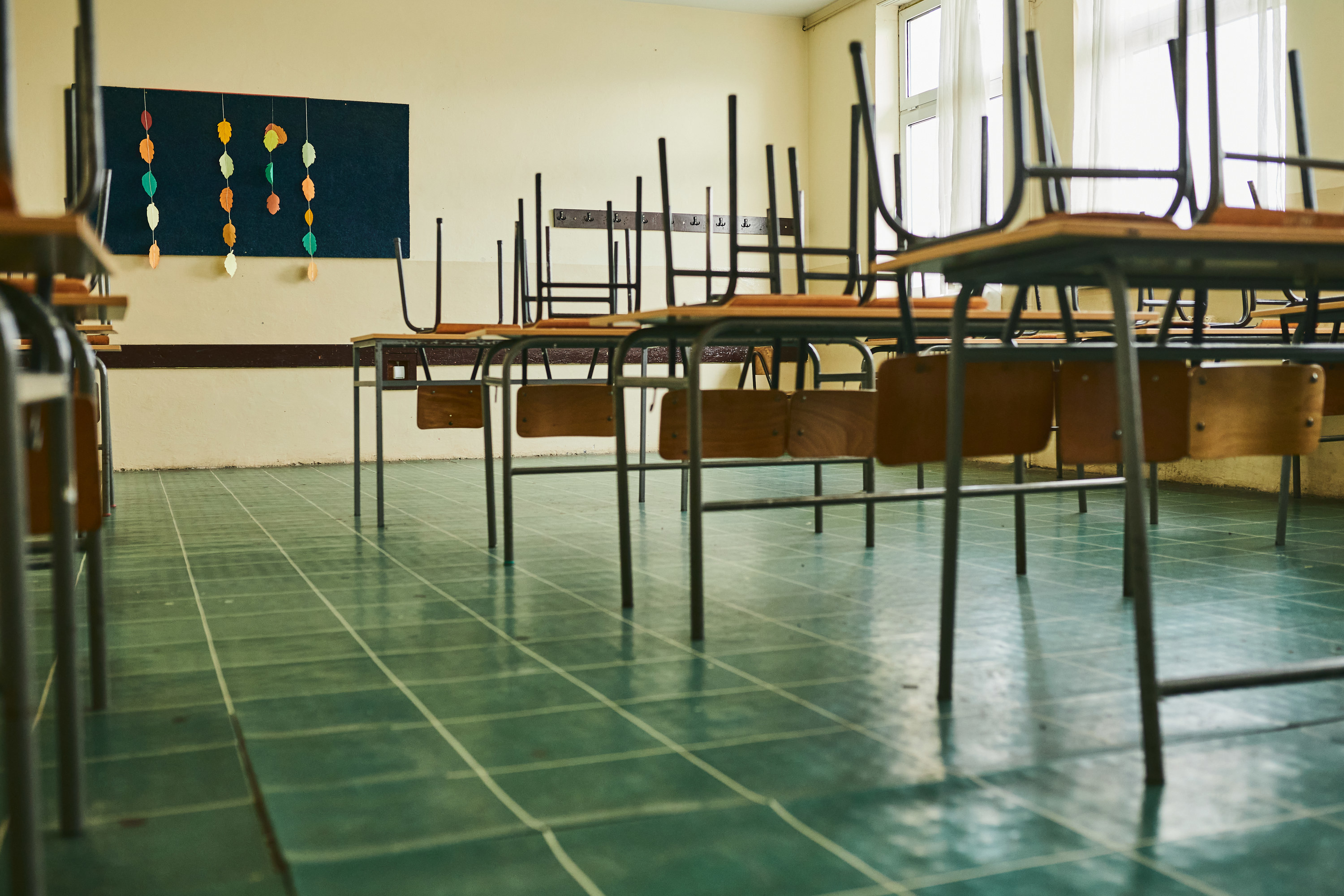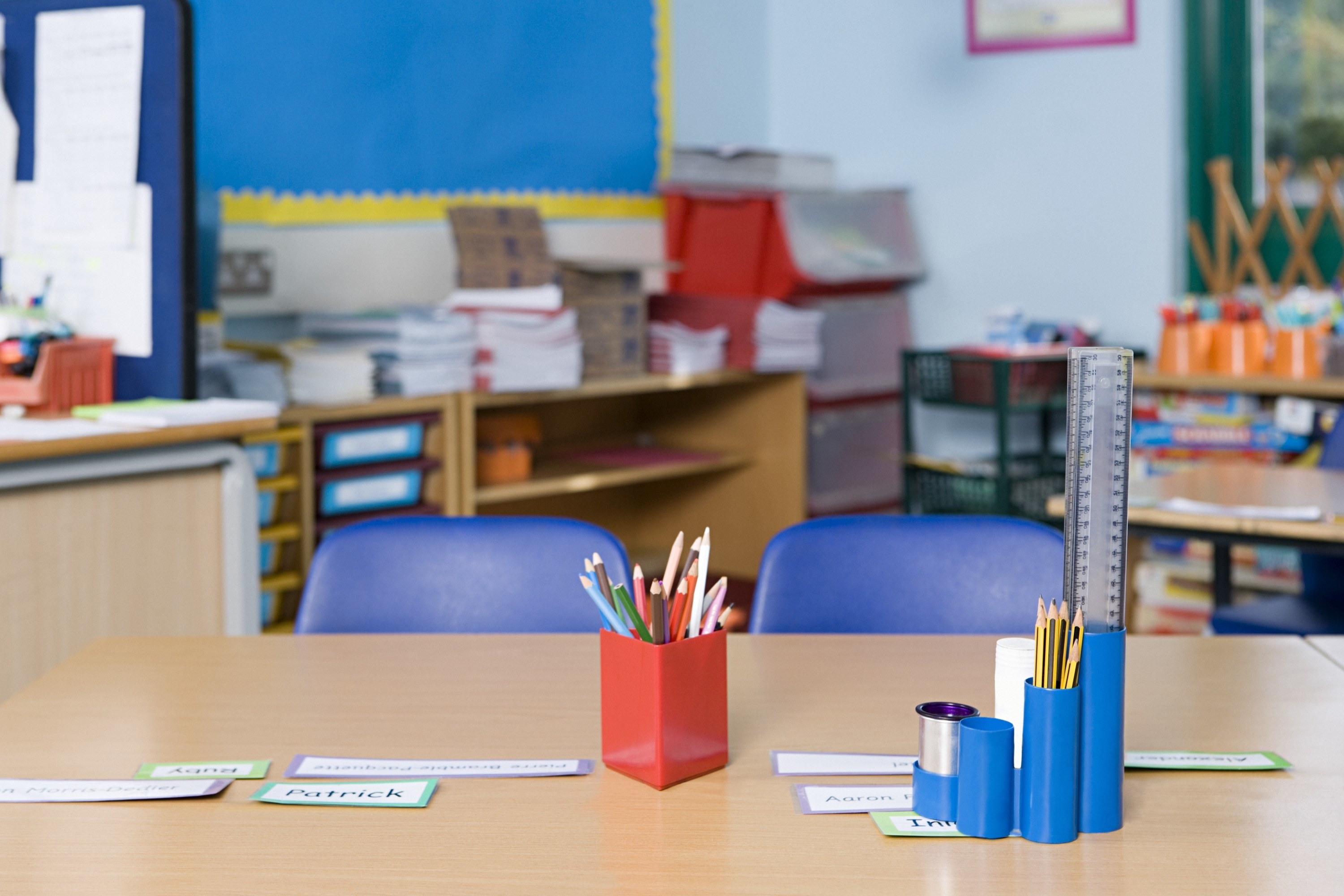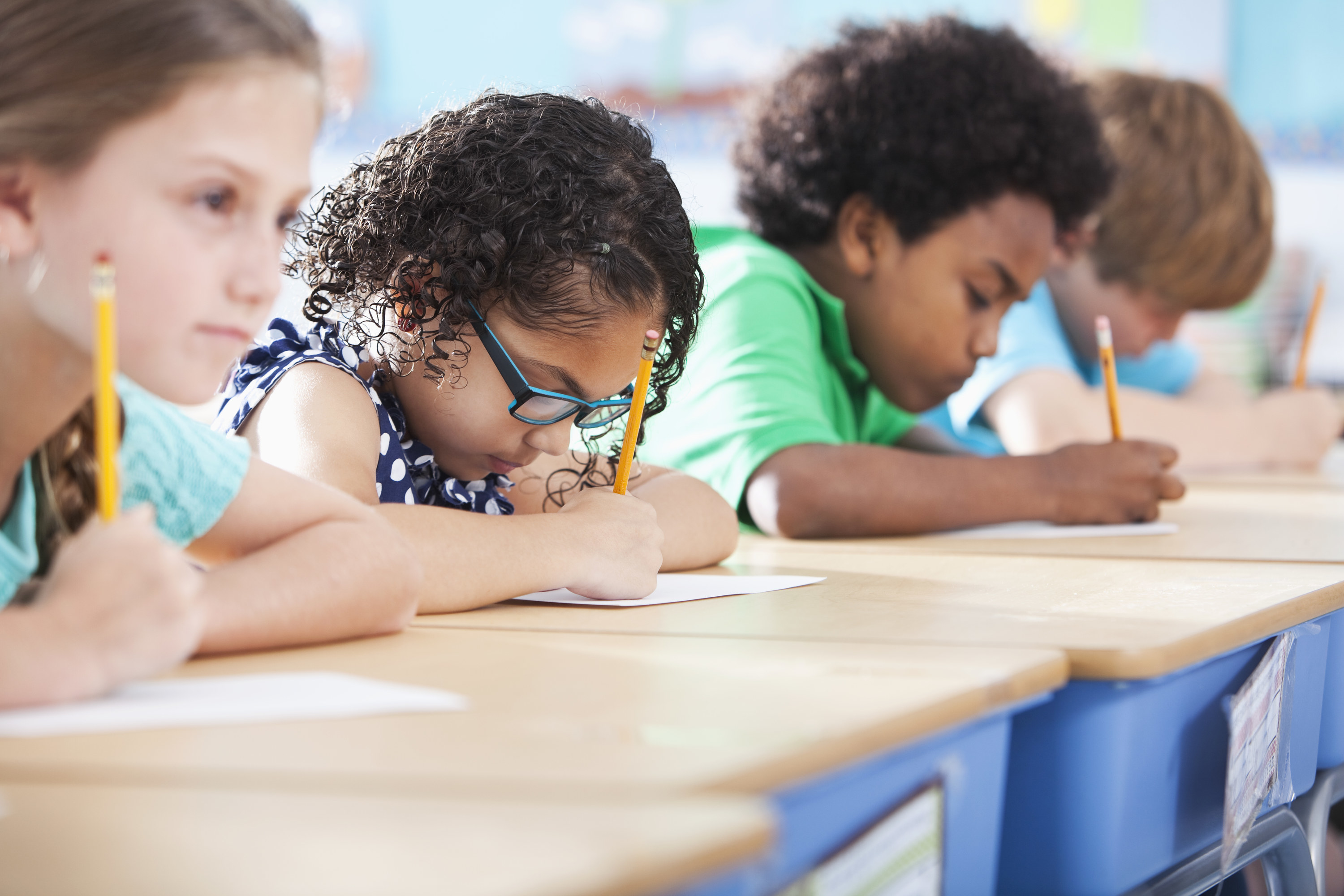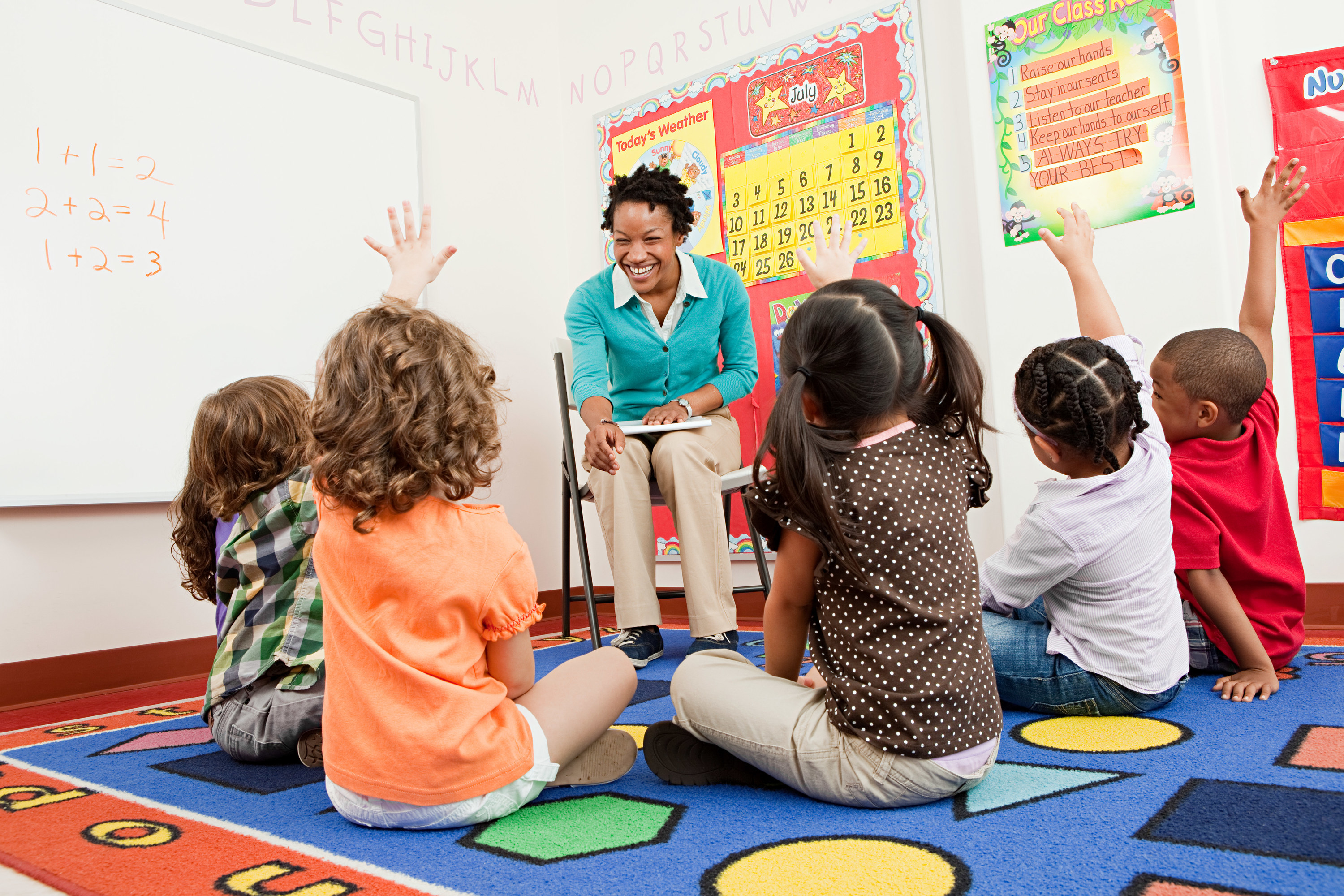We all know that students learn from their teachers. But sometimes, teachers learn from their students, too.
Well, recently, we asked teachers of the BuzzFeed Community to tell us about an experience they had with a student that impacted them and caused them to change something about how they conduct their classes.
They didn't hesitate to share, so here are some of those compelling and thought-provoking experiences:
1. "I teach high school English. I had a student one year with a pretty severe anxiety disorder. Their parents told me it was so bad that they might not even ask to go to the bathroom if they needed it. To make sure they felt comfortable, at the start of the year, I told all students that they were old enough to go to the bathroom without having to ask permission. I also added that if they just needed a break or to stretch their legs, they were free to leave the classroom as well."

2. "High school English teacher here. When I was a student, my teachers would often do 'popcorn' reading, where students would read aloud and then throw the reading to their peers by saying, 'Popcorn so-and-so.' It was generally a fun way to keep students engaged. While student-teaching, I decided to have students popcorn read a passage from a novel. A student popcorned his classmate, who clearly looked very embarrassed and hesitated before reading aloud. Within the first few seconds, I could tell that this student must struggle with a form of dyslexia — he stumbled over many words and seemed to guess what word he was reading by the first two or three letters. After realizing how humiliating this could be for students who struggle with reading challenges, I now read passages aloud myself and then ask students if they would like to read aloud (which they can decline)."
"I also gave that particular student the role of stopping and starting any audiobook I played." —rebeccab457333985
3. "It was my first year teaching at a Philadelphia public school. Our school had a uniform policy that banned hooded sweatshirts. I had one student who came into class for first period every day with a hoodie and consistently refused to take it off. Being a first-year teacher, I was told to not seem weak and be consistent in enforcing rules. Each day he came in with the sweatshirt, I’d ask him to remove it. He wouldn’t, and I'd call a dean to have him removed from class. It was a toxic loop that went on for a few weeks. Finally, a veteran teacher came to talk to me. She told me she knew that this particular student was experiencing intermittent houselessness and was currently at a spot that did not have heat. 'This baby is cold, not defiant.'"
"It smacked me like a Mack truck. From that moment on, I realized how important it is to build relationships with students so that you know what’s going on in their home life. It’s the only way to be an effective teacher." —Anonymous, Pennsylvania
4. "I am a primary teacher and have a student who was in a car accident with her mother. Her mother unfortunately passed away. I am now fully aware of the many different kinds of families out there and am trying to steer clear from 'mother,' 'father,' or 'parents' language. I also am not going to celebrate Mother’s Day and Father’s Day like we usually do."
"Too many kids out there don’t have a mom or dad to celebrate, and I think it is incredibly important to consider that." —Anonymous, California
5. "I became a teacher after I had two children of my own. I had to do a 20-hour practicum in a sixth-grade class, working on reading and comprehension with a particularly tough set of kids. I gave them an assignment that I was going to check on the next day. Out of seven kids, two of them had their assignments. Naturally, I took on my 'teacher face' and asked why they didn’t do their work. There were excuses like, 'I didn’t have paper at home,' 'I had too much work to do in the house,' and, 'I didn’t know how.' So I responded, 'Why didn’t you ask your parents for help? I’m sure they would have helped if you’d asked,' and, 'You can always take paper from another notebook.' Only one kid spoke up, and his answer will never leave my memory as long as I live. He said, 'You have to be one of those cookie-baking, PTA mothers who cook dinner every night and do laundry and shit like that, huh?'"

6. "I used to teach writing using a Standard American English rubric, so I expected my students to work toward mastering the formal language. One semester, I had a student whose writing was brilliant beyond his years, insightful and witty, but he couldn't seem to grasp the mechanics of formal writing. When I sat down with him one on one to discuss where he could improve, he pointed out the rules from AAVE (African American Vernacular English) he was using. It became really obvious that this kid was doing great, he just spoke another dialect of English at home. After that, I changed my curriculum so students would be graded on their mastery of English as a whole, not just the privileged standard version."
"It's incredible how much students can thrive when we don't get in their way!" —Anonymous, Michigan
7. "I teach eighth-grade math. This past year was a struggle for many students. However, I had one student who seemed to be struggling more so than others. When given an assignment, this student would turn it in blank every single time. Turns out, he had incredibly severe anxiety, and seeing all of the problems on the paper would cause him to shut down. He knew how to solve the problems but couldn’t show me how he got the answer. For the next quiz, I had the teacher assistant monitor the class while I took this student to a separate room and verbally gave him the problems one at a time. He was able to verbally walk me through each problem correctly. I'm now adding a question to my beginning of the year student survey, 'How do you prefer to demonstrate your math abilities? Via pen and paper assignments or verbal demonstration?'"
"I had spoken to him numerous times, and he would just shrug his shoulders when I asked why he wouldn’t even attempt it. It wasn't until one day that I was finally able to get an answer out of him.
Not all students show proficiency the same way." —maliaswift02
8. "The day one of my seventh graders broke down because they couldn’t get their homework done changed everything for me. Their mom and dad worked three jobs apiece, there were four other kids in the house, and this kid took care of all of them while the parents were working. It’s been six years, and I haven’t given homework since then."
"It broke my heart. The homework is not worth it." —jacibailey
9. "I’ve never been a teacher to shy away from making contact with home. I’d probably make a few calls a week in the past. However, it became an inevitable daily part of the job this year during the pandemic. Between the more frequent phone calls and the video conferences I was holding with my students, I became more intimately acquainted with the homes of my students. What I learned quickly is that more of my students than I’d ever imagined were living in dirty, loud, smoke-filled homes. It was common for other individuals in the home to yell, cuss, walk by on camera with no shirt on, and demand the students get off the computer during class to go walk a dog, watch a sibling, or run an errand. After this year, I will never be super firm about a due date again, and every kid will have the chance to re-submit work. I don’t know how they get anything done in those homes, and I won’t be the teacher who holds them accountable when they’re struggling to focus in places like that."

10. "After learning of some students I had that were trans but too scared to go by anything but their dead names and old pronouns, I added a place for preferred names and pronouns on a 'Getting to Know You' assignment that I give at the beginning of the year. Only I see it, and I privately ask if I can use their preferred name and pronouns in class. It makes SUCH a difference for some kids."
"It is so easy to do. I don’t care who the attendance sheet says you are. Who do YOU say you are?" —lisamariegc
11. "I’ve been teaching students with disabilities, including intellectual disability, multiple disabilities, autism, TBI, and OHI. My students are high school-aged but cognitively and sometimes emotionally function at preschool to third-grade levels. A lot of my students have ADHD or exhibit stimming behaviors. I used to be super strict about making sure the kids were exhibiting 'normal peer behavior' which essentially meant I was refusing them from participating in activities that calmed and regulated them. I started following an autism advocacy page on Facebook and learned so much about how what I was doing was actually harmful."
"I now don’t care if my students stim or need to regulate themselves in a non-traditional way to what schools expect. Also, I don’t expect eye contact when I’m teaching because I know that can be very difficult for some kids to maintain, but I know they are still listening." —jessical4fde3b024
12. "I had my first trans student whose name on record clearly did not match their identity. It made me reconsider how I called roll on the first day of class — because the last thing I wanted to do was out someone. Now, I call first-day roll by last name, and I ask each student to share their preferred name and pronouns (doing my part to normalize that!)."
"I've since had several other trans students who have told me that they really appreciated the discretion.
And after *years* of me campaigning for it, my college now has a policy where students can have their preferred names on their logins, even if it's not yet their legal name!" —prolixitie
13. "I teach college math and used to have strict attendance policies — the 'four or more absences gets you an F' kind. After a few years, I realized that I didn't care that much about it, and my policy didn't cause any student to change their behavior. But it did hurt the ones that have a lot going on in their lives, whether that be multiple jobs, families, etc."

14. "I taught grade seven for years and told my students that I suffer from depression and anxiety. I discussed what it looked like when I was having a bad day and my coping mechanisms and strategies. For years, I was the first person any of the intermediate students would go to when they were feeling down. Students struggling with sexuality and issues at home came to me first because they knew I could relate to them."
"Lots of parents complained – hello… stigma much?! — but the administration knew that this was a huge opportunity for our students and supported my discussing everything.
I teach younger students now, so I don’t divulge with them, but mental health is still a priority in my daily classroom." —t4e202438f
15. "It's been more than 20 years later, and I'll never forget a graduating student from about 15 years ago. He came by my class to say goodbye, and, after exchanging pleasantries (and a thank you for letting me eat lunch in your room every day), he told me about the relentless bullying gay students faced at our high school. I was gobsmacked; I truly had no idea. When I asked him why he didn't confide in me any of the many lunch periods he spent in my room, he said, 'Because it's just how it is here.'"
"That conversation so shook me to my core that it started my lifelong journey to be a visible and vocal ally both inside and outside of the classroom." —jmcv
16. "On January 6, 2021, we were still on winter break, and I watched the horrific attack on the US Capitol unfold on the news. I was in high school when 9/11 happened. As an adult, I am grateful for the guidance and empathy of my teachers that day. It occurred to me that my kids weren’t getting that as this was all going down since school was not in session. So I set up a separate GMail address and told them that if they ever needed a trusted adult to talk to, day or night, they could email me, and I would get the email on my phone immediately. Since setting it up, I’ve had kids come out to me; express concern that they were LGBTQ+, but their parents had a Trump flag in the yard; express anxiety over the fact that they want to get vaccinated, but their parents won’t let them; and more. I don’t always have the answers to help them, but, at least this way, they have an adult they trust to listen that they can get ahold of any time they need to."
"I'm a high school band teacher. The 2020-21 school year was really difficult for students nationwide (and worldwide) for obvious reasons. I have always made myself available to kids if they need a trusted adult to talk to.
Oftentimes, the kids will choose to talk to me even after I try to refer them to the school psychologist, simply because they feel more comfortable with me. With all the typical after-school rehearsals, Friday night football games, and Saturday competitions, we’ve spent a LOT of time together, and I usually get to keep kids all 4 years.
However, I have a hard and fast rule that I do not check school email outside of work hours, for my own mental health. (Not because of the kids, but just because, for example, who wants to get an email from their boss when they’re laying in bed at 11 pm after working a 14 hour day on a Saturday? Yeah, not me.) So the separate account works well, especially in a year that's been so traumatic." —Anonymous, California
17. "My first year teaching, I had two much older mentors who guided me toward nit-picky rules like not giving pencils or refusing late work. I thought that was how you did things until I realized that some kids truly don’t have someone at home giving them school supplies, checking homework, and a hundred other variables. Now I give supplies out freely."

18. "This one was actually with a parent. I had a teenage student with traumatic brain injury due to shaken baby syndrome. The father was a rigid police officer with seemingly no empathy or patience. I assumed that he was involved in the incident that caused the disability. Turns out, the person who caused it was a teenage babysitter. The parents will have to support their child for the rest of her life due to one fateful night trying to share some time together. It taught me to never judge the parents."
"You never know what they are coping with." —Anonymous, Alaska
19. "The need for preferential seating — my first time working in a primary special ed class opened my eyes to this. Many children couldn’t sit still in their chairs for a minute. I was losing my patience. One day, my student said her brain wouldn’t let her sit still no matter how much she tries to tell it to. A lightbulb went off in my head. I should’ve known this! I got floor cushions, exercise balls, etc. I even let kids lie down on rugs during writing and/or reading."
"Oh, and they could stand during lessons or do stretches to get their wiggles out. It helped the kids immensely." —okokimono
20. "I think all of my students impact my teaching in some way because every student learns and behaves differently. The biggest change I’ve made is probably giving students the chance to share. It seems so simple, but it makes such an impact. It started with a student notorious for acting out. I had him for a 90-minute reading lesson, and other teachers told me stories about his behavior. I started the class but saw his hand raised, so I let him share. He told a five-minute story about his family, then he participated well in the lesson. I started giving time each lesson for all students to share."
"It took time, but I’ll give up ten minutes of my lesson for student engagement the rest of the time. My goal is to always meet them where they and learn what works best for them.
I started doing this with other groups, and they loved it! It’s such a great way to build relationships, and students love it when you follow up with them like, 'How was your soccer game yesterday?'
I just ask if anyone wants to share anything – no pressure — and students, even the shy ones, love the platform and chance to talk. I sometimes add daily affirmations we all say together. It all started with the 'bad kid' who wanted to tell me all about his family. Kids just want you to listen sometimes." —Anonymous, Virginia
21. "My first year as a teacher, I constantly prompted my off-task third-grade student — actually tapping his paper. Then one day, I watched him work on a problem that no one had solved. He was diligent in his work — trying again and again — until he eventually found the answer. As a class, we celebrated. As a teacher, I learned to open my mind, and my eyes, to what learning can look like. I never tapped another paper."

22. "I always called my kiddos things like 'sir,' 'ma’am,' 'love,' etc. One day, a kid asked me why. I explained that it was to show respect. He replied, 'But I don’t like it.' It made me realize that I was putting my own thoughts of respect and kindness onto the kids without ever asking what they wanted."
"After that, I always ask what they prefer to be called and if they are okay with nicknames or terms of endearment. It is surprising how much a little act like that changes a relationship for the better." —reginaphalange87
23. "I was thoughtlessly using the phrase 'parents' in my classroom. In my second year teaching, I had a transfer student who was a foster child. He was very withdrawn and not interested in connecting because he had been bounced around. The first time I said 'parents,' I saw him look away. I felt awful because I just hadn’t been thinking. From then on, I said 'your grown-up.' The very next time I sent something home, I said 'your grown-up,' and he smiled a little."
"He began opening up a little in class and even made a couple of friends. It was a little thing for me to do, and it really helped him feel a sense of sameness with his peers.
I always look at every bit of information about my students' background now so I can make them feel safe and included." —Anonymous, Utah
24. "My first year teaching, I gave homework worksheets at the end of each class period. They were short and fairly straightforward, but I had one student who never did them. However, he paid attention in class and managed to do well on tests. I found out toward the end of the year that he had to work a job after school to help provide for his family so he had no time to do homework. After that year, I stopped grading homework completely."
"I still give it for students who needed more practice, but it’s no longer graded because I won’t know their home lives." —Anonymous, Wisconsin
25. "It was a grade one to two class. I asked the class my first ever question, and a student gave me a totally wrong answer. I said, 'No, that’s wrong.' Watching eagerness turn to disappointment was enough to never say an answer is just wrong again. I felt physically sick. Usually, I now say something like, 'It’s going in the right direction but not there yet,' 'I can see how you might think that,' or, 'I like that you are looking for a connection to what you already know.'"

26. "I teach 11th-grade US history. On top of hybrid learning this year, my boyfriend started to show symptoms of bipolar disorder. I had to call 911 because I was afraid he’d hurt himself or others, and he was taken by the police to a hospital. He stayed for a week, and I missed some work. After, I was talking to my students, and my absences came up. I told them the details of why I had been out and the symptoms I saw in my boyfriend. I said it'd been hard, but mental health is a priority we addressed for his well-being, and I was glad we did. Later, one student came to me during lunch and said as he listened to me explain mania, he felt that I was describing him. I decided to be open about my experiences with mental health and ask my kids how they're doing mentally thanks to everything brought on by COVID. We've had some amazingly beneficial venting sessions. As things are getting back to normal, I want to keep checking in with my kids' mental health."
"I went into basically the ugly details For about 10 days, he was entering a severe manic episode: he stopped eating, stopped sleeping, his mind seemed to be racing 24/7, he would get emotional and cry, he’d scribble his ideas on scraps of paper and leave them all over the apartment, etc.
He’d been somewhat manic before but never to this degree. He was experiencing severe psychotic symptoms. This was the first time he was ever diagnosed with bipolar disorder. He ultimately got medication and became stable again.
They were all so attentive as I talked about it. The student who confided in me had also failed my same class the previous year. He was quiet, reserved, and, before this, he didn’t talk to me much. We made small talk and I asked him what was up and if everything was okay when he opened up. He felt frustrated because no one at home knew what emotions he was going through. He was afraid that his parents would think he was crazy.
I told him I was glad he shared his thoughts with me and that I believed it would be beneficial if he talked to one of our school counselors about it. He agreed, and we arranged for him to meet with one.
They gave him emotional coping mechanisms and referred him to a mental health doctor. He would come and visit my room every once in a while during lunch to catch me up with how he was doing mentally. We all need mental health check-ins." —Anonymous, Texas
27. "I’m a special education teacher for students with severe disabilities. I’ve learned over the years that offering choice is HUGE (i.e. Do you want to do this now or in five minutes? Do you want to do it yourself or do you want help? Do you want to sit in the blue chair or the red chair?). Offering a choice, even if it seems like the smallest thing, can be so empowering and teach important life and independent skills."
"Neurotypical children have the privilege of making countless choices a day, and we take that away from our disabled students." —Anonymous, Massachusetts
28. "Once, a student was given detention for wearing a sweater that wasn’t the proper school sweater. I found her crying in the classroom later that day — where she told me she couldn’t afford the school sweater. The next day, I kept a stock of school sweaters in the back of the room for anyone who couldn’t afford them."

29. "During parent-teacher conferences, a parent once told me how thankful she was that I grade using colorful markers with smiles, rather than X's. She said her son hated the color red because his previous teacher would mark his papers with huge red X's. In my class, her son came home much happier to show off his colorful smiles."
—Anonymous, Maryland
30. "Distance learning was hard. My frustration was evident, as was the frustration of my kids on a daily basis. We implemented a social-emotional curriculum, and one lesson focused on identifying our emotions, naming them, and calming down. We practiced as a class often, but it was so much more effective when I actually used those strategies in front of my kids when I was frustrated. Rather than just teaching them, I started doing each calm down strategy. My kids started doing it, and parents mentioned how it helped at home."
"Sometimes, the best teaching is just by leading by example." —Anonymous, California
31. "College professors give anywhere from two to five exams in a class. We try to space them evenly apart but fail to realize every professor is doing the same thing in their class. For the student, that means having multiple exams in the same week or day. Sure, we want them to be disciplined and organized so they can handle an exam load like that – we tell them ahead of time when their tests will be! However, that’s still asking a lot of young adults who are learning discipline and organization but don’t necessarily have the skill yet. So, instead, to help them practice, I tell them on day one to look at all of their class, athletic, social, etc. schedules for the semester, identify any points when they think they will have a hard time juggling everything, and let me know in the first three weeks of class if they want to reschedule any of their exams with me, no questions asked."

32. "Hunger! So many kids are hungry during the school day. Some of my students have blood sugar problems, don't have food at home, and can't afford lunch. Some are just growing a lot. I've had snacks available for students to eat for years. I don't make them ask for them, and not a single student has ever taken advantage of it."
"It's an out-of-pocket cost but completely worth it. It feeds hungry kids and cuts way down on 'hangry' behaviors." —Anonymous, Kansas
33. "As a pre-K teacher, I’m very accustomed to the tantrums and other difficulties that come with the job. But this one kid changed everything. He had faced difficulties in school since he was an infant, biting, hitting, etc. By the time I had him, he was killing worms during outside time, and spitting on, hitting, and kicking other students and teachers. He'd throw heavy objects at people. He'd do everything in his power to instigate other students and disrupt the classroom. He'd also often ask us what would 'dead' us, offering eerily graphic hypotheticals. In response to his apparent lack of empathy and remorse, we (my teaching team) modified and instituted the teddy bear curriculum which emphasizes creating habits of respect, communication, mindfulness, reflection, boundary-setting, etc."

34. "A student was moving out of district and had forgotten to return a paperback novel (probably worth less than $10). My department head at the time was a real stickler for returning materials, so I told the kid he needed to have someone bring the book to school. The student’s father showed up obviously impaired — probably drunk. The poor kid was so embarrassed, and I felt horrible. Two things became clear to me: Kids are more important than materials."
"The second, kids and their lives are complicated." —Anonymous, Massachusetts
